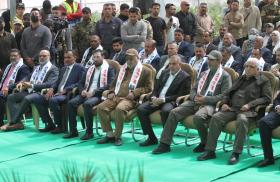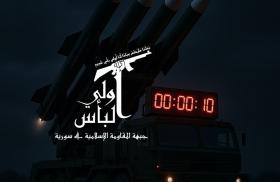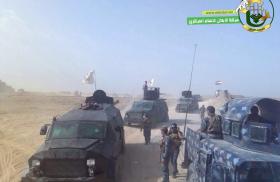Profile: The Muhandis General Company
Part of a series: Militia Spotlight: Profiles
or see Part 1: How to Use Militia Spotlight: Profiles
By establishing this Iraqi version of an Iranian IRGC conglomerate, militias aim to quickly dominate the country's growing economy.
Name: The Muhandis General Company for Construction, Engineering, and Mechanical, Agricultural, and Industrial Contracting (hereafter the Muhandis General Company, or MGC).
Type of movement:
Commercial entity controlled by Iraqi muqawama (resistance) militias and their political factions and owned by the Popular Mobilization Forces (PMF). Similar to Khatam al-Anbia, the Iranian company owned by the Islamic Revolutionary Guard Corps (IRGC), a U.S.-designated terrorist organization.
Role:
To provide Iran-backed PMF militias with an economic conglomerate akin to the IRGC's Khatam al-Anbia construction arm in Iran—that is, a commercial vehicle with unique advantages in winning business, designed to be unlimited in terms of activities, sectors, and the types of government assets transferred to it.
History and objectives:
- Beginning in 2018, Iran-backed militias and politicians pressured successive prime ministers to facilitate the creation of such an economic conglomerate under the PMF's control.
- The first two attempts in 2018 and 2020—named Motassim and Al-Rashid—were blocked by international pressure and opposition from the government of former prime minister Mustafa al-Kadhimi.
- After replacing Kadhimi in 2022, Prime Minister Mohammed Shia al-Sudani announced the formation of the MGC in his sixth cabinet session (November 28, 2022). The new company was named after Abu Mahdi al-Muhandis, the U.S.-designated terrorist and Kataib Hezbollah founder who was killed by a U.S. airstrike on January 3, 2020.
- The MGC's February 6, 2023, articles of incorporation paint a picture of an extraordinarily advantaged commercial entity. The company's permitted activities include (but are not limited to) industrial projects, mining, large-scale agricultural projects, vehicle and equipment imports and rentals, textile and leather manufacturing, and animal slaughterhouses. The company gives itself preferential treatment with regard to government tenders, setting out its own terms and conditions, and is not required to meet the same collateral requirements as other borrowers. This is effectively a mandate to create a miniature PMF-run economy within the broader Iraqi economy, with the ability to secure billions of dollars’ worth of no-bid government contracting just as Khatam al-Anbia does in Iran.
- The November 2022 cabinet decree creating the MGC stipulated that the company will be capitalized at 100 billion Iraqi dinar ($76 million), of which 90 percent will be transfers of government property (at undisclosed discounts) and just 10 billion dinar ($7.6 million) will be cash. Considering the company's large-scale ambitions, this suggests that massive grants of land and government property will be made at almost no cost—in other words, asset-stripping of the state.
- In an opening action, the MGC received 1.2 million acres (1,930 square miles) of free government land on December 6, 2022—all without any visible paper trail. To give a sense of scale, this is half the size of Lebanon. Crucially, the land grant is located along the Iraq-Saudi border, from whence PMF militias have launched drones into Saudi Arabia and the United Arab Emirates on multiple occasions since 2019. On March 21, 2023, a tree-planting program was inaugurated on the land in al-Muthanna province (Figure 1).
- In what may be the first example of an urban land appropriation, a PMF group took over a large piece of prime west Baghdad real estate on April 24, 2023, on behalf of the MGC, seizing a chunk of historic downtown Baghdad as large as twenty New York City blocks, or the entire grounds of Buckingham Palace or the U.S. Capitol. The individual who spearheaded the seizure was Maj. Gen. Thamir Mohammed Ismail (aka Abu Turab al-Husseini), a Badr Organization official with senior rank in the Interior Ministry who was involved in the crisis cell that arranged the killing of protesters in 2019.
-
Abbas al-Zamili, the head of the Badr Organization’s parliamentary bloc, revealed on May 22, 2023, that 400 billion Iraqi dinar ($305 million) had been “added to the investment budget of the PMF’’ for use by its new Muhandis General Company. The MGC was also granted protection from public auditing under the PMF's special secrecy status, which is only held by one other Iraqi agency, the Iraqi National Intelligence Service.
- There are also indications that the PMF has used the MGC to obtain further land grants on the Jordanian border and in Diyala province. There are located at Trebil (Anbar-Jordan) and Muntheriya (Diyala-Iran) crossing points, and suggest a trend of locating MGC/PMF joint bases at points of entry.
- On March 8, 2024, the China Machinery Engineering Corporation (CMEC) signed an MOU with the MGC to undertake joint projects in fields including construction, engineering, trade, services and energy projects.
- In July-August 2024, there was discord between MGC and Hamid al-Yasiri, head of Ansar al-Marjaiya (the PMF's 44th Brigade) and a senior commander in the Atabat—the so-called "shrine militias" that take direction from Grand Ayatollah Ali al-Sistani and the Ministry of Defense, not the PMF Commission. The arguments focused on large land grants to the MGC in Samawa, Muthanna, including land that was previously allocated for future use as housing for Ministry of Agriculture employees.
Chain of command:
- The MGC's February 2023 articles of incorporation were signed by U.S.-designated human rights abuser “Faleh al-Fayyad, President of the Popular Mobilization Forces.” The beneficial owner of the MGC thus appears to be the PMF Commission, an entity under the Prime Minister’s Office. Fayyad attended the March 21, 2023, opening of the company's al-Muthanna project. Fayyadh signed the March 8, 2024 MOU with the China Machinery Engineering Corporation (CMEC).
- PMF chief of staff Abdul-Aziz al-Mohammadawi (aka Abu Fadak), a U.S.-designated terrorist from the Kataib Hezbollah militia, has been instrumental in the effort to secure land parcels in al-Muthanna—first unsuccessfully via an investment license, and later successfully by cabinet decree. Fadak also attended the March 21, 2023, opening of the Muthanna project.
- PMF secretary-general Tahseen Abid Murat al-Abboudi (aka Abu Muntadher al-Husseini) also attended the Muthanna opening cerermony. He was previously involved in the crisis cell that arranged the killing of protesters in 2019.
- The CEO of MGC is an engineer named Salah Mahdi; he also heads the company's inaugural al-Muthanna tree project.
- As a component of the PMF, and thus the Iraqi security forces, the MGC is nominally under the authority of the prime minister as commander-in-chief.

Affiliate relationships:
- The China Machinery Engineering Corporation (CMEC) is a commercial partner to the MGC since March 8, 2024.
- The following political figures also attended the March 21, 2023, launch of the MGC's inaugural project:
- Falih al-Khazali, a member of parliament from Hadi al-Ameri's Fatah wing of the militia-led Coordination Framework. He is affiliated with Kataib Sayyid al-Shuhada.
- Mustafa Sanad, a member of parliament affiliated with Kataib Hezbollah, though he describes himself as an independent.
- Abbas al-Zamili, a Badr Organization parliamentarian from Ameri's Fatah wing of the Coordination Framework.
- Ektifaa al-Hasnawi, a parliamentarian from Ameri's Fatah wing of the Coordination Framework.
- Basim Khashan, a self-described independent parliamentarian from al-Muthanna who caucuses with the Coordination Framework.
- Iraqi ministries:
- Even before the company's incorporation, the MGC and its antecedents (Motassim and Al-Rashid) sought the transfer of government land and assets from the Ministry of Housing and Economy and the Ministry of Industry and Minerals. The antecedent entities unsuccessfully pressured the National Investment Commission for free access to enormous tracts of government land in al-Muthanna in 2021-22.
- Before the Muthanna tracts were legally transferred to the PMF, officials from the Ministry of Water Resources visited the project on November 20. Sudani's minister of agriculture, Abbas al-Alyawi, transferred the tracts to the MGC.
- The MGC will probably seek further land grants from the National Investment Commission, provincial-level investment commissions, the federal cabinet, and individual ministries (e.g., the Ministry of Construction and Housing, Ministry of Agriculture, Ministry of Industry and Minerals, Ministry of Defense, Ministry of Oil, or the default landowner in Iraq, the Ministry of Finance).
- The aforementioned Badr official Maj. Gen. Thamir Mohammed Ismail (aka Abu Turab al-Husseini) has seized land on behalf of the MGC.
Subordinate elements:
- The MGC's exact governance and management structure, board, business address, beneficiaries, banking arrangements, and subsidiaries are not yet known and are not explained in the company's February 26, 2023, articles of incorporation.
- New, hidden subsidiaries likely exist but have been hidden, including operations in tree-planting and solar power installation.









